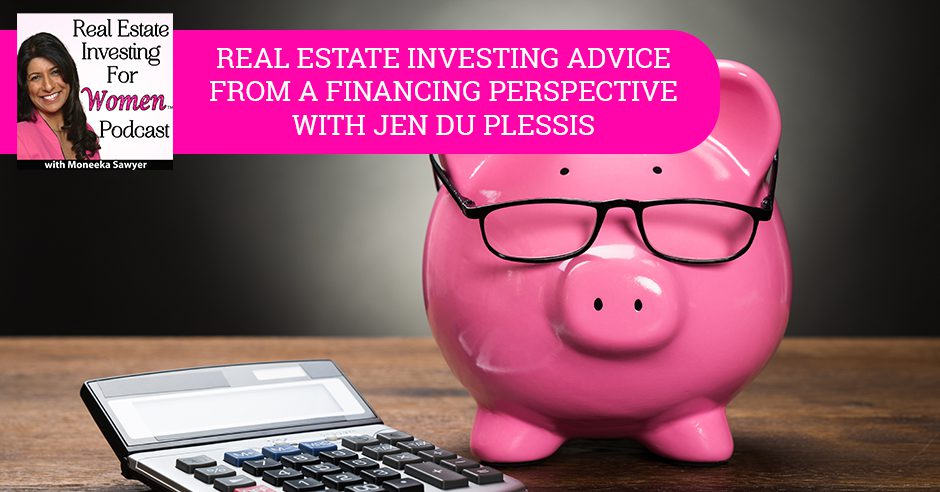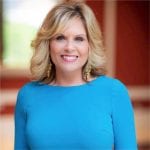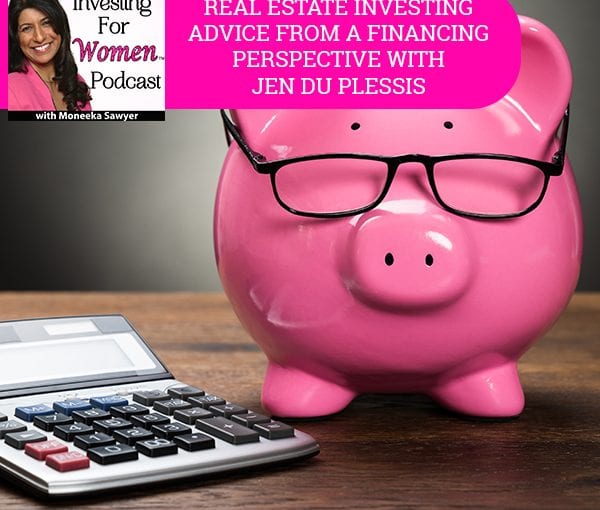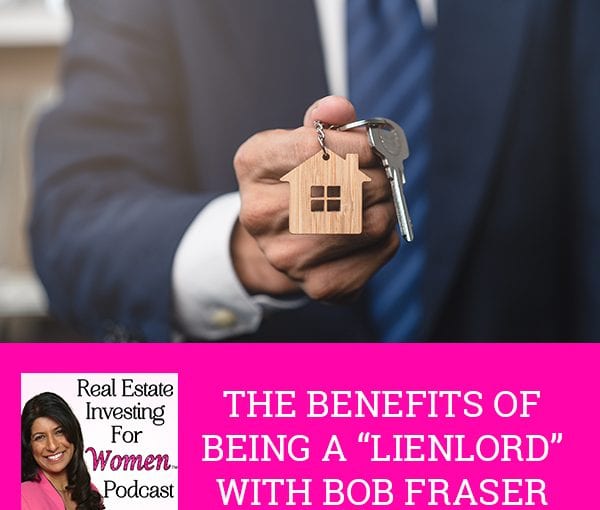0

There are so many people who claim to know everything about investing, but unless they do it themselves and are on the ground, it’s better not to take their advice. Far from that, Moneeka Sawyer interviews someone who has a wealth of knowledge and experience about real estate investing. She brings over Jen Du Plessis, America’s Mortgage Mastery Mentor, to share with us some great investing advice from the financing perspective. Jen reveals some of the myths of financing and the things you need to know about local lenders while also sharing advice along the way. Believing that we can live our legacy while building it, Jen then reminds us to live a beautiful life and to play with passion.
—
Listen to the podcast here
Real Estate Investing Advice From A Financing Perspective With Jen Du Plessis
Real Estate Investing For Women
I am excited to welcome to the show, Jen Du Plessis, America’s Mortgage Mastery Mentor believes that you can live your legacy while you were building by working on purpose to play with passion. She is recognized as an influencer in her industry as the best-selling author of LAUNCH: How To Take Your Business To New Heights. Hosts of the top-rated podcast, Mortgage Lending Mastery, which I’d been on, and is a highly sought out and charismatic international speaker speaking on stages with such icons as Darren Hardy, Tony Robbins, and Les Brown.
She works with mortgage loan officers and real estate professionals who are overwhelmed, stressed out, and sabotaging their personal lives for the sake of their business to help them multiply the results in record time while having the courage to say yes to their personal lives which sometimes means saying no to clients. She has been seen and heard on Good Morning America, Sirius/XM Radio, Voice America, and Mortgage News Network, and has been recognized with the Women With Vision Award as one of the Top 20 Most Powerful Women in the mortgage industry.
—
Jen, how are you?
I’m great. I am excited to be here. We had so much fun on my podcast. I can’t wait to have as much fun on yours. We clicked well so it’s an exciting time and I’m happy to share whatever I can for your audience.
I was feeling the same thing. I get to talk to Jen again. I know that your focus is on helping real estate professionals do their job and run their businesses better but tell us a little bit about your investing journey.
I was investing way before. I have ten aunts and uncles. My mom was 1 of 10, five men, five women. All of the men are real estate investors. I was exposed to it since I was young. I was cleaning apartment buildings at Central Michigan University where they own a lot of property. My mom and dad were investors as well. They had a unique way that they did things. That was left to my brother and I when they passed away. We started our own investing. In fact, we bought our first home when we were nineteen years old. My husband and I got married a few months later.
By the time we were 24, we had five properties. At that time, it wasn’t popular for fix and flip and things like that. It was, buy the house and they were cheap back then. You’d save a little money and buy a house. Sometimes we pay cash or we had seller financing and stuff but we did step investing. Part of step investing is also that we didn’t need the cashflow. Therefore, all of the cashflow went back into paying everything off as we went along the line. Later, we traded in the houses for the hotels on the monopoly game and that’s multifamilies and stuff. These days, we’re doing Airbnbs and we’re doing subject tos.
We buy subject to properties. I’m excited about this new market and it’s sad because we’re in COVID challenge. While we’re in the COVID challenge, some people are going to lose their homes. I’m excited about the opportunity to help them, not just to take from them. Furthermore, I was training real estate agents for years and I would ask them, “How many of you own your own home?” I found that a lot of real estate agents never even owned their own homes. They got into real estate and never owned their own home. Those that did own their home, I say, “How many of you have investment properties?”
I can honestly tell you, of the eighteen years I was teaching real estate agents, less than 1% of them owned many homes. To me, that’s like me being a Mary Kay Consultant and saying, “I don’t wear makeup but you should wear makeup.” A sales guy saying, “I still riding on a horse and buggy but you should buy a car.” I found that they weren’t buying their product. I didn’t want to be in that position as a mortgage lender. I wanted to be in a position where I was buying the product that I was helping people achieve and obtain to grow wealth. One of my niches was doing investor loans.
I tell people this all the time. When you’re looking for a mortgage broker or you’re looking for a real estate agent and it’s for your investments, make sure their investors themselves because anybody can sell a house but somebody who understands what it’s like to be an investor, the things you need to look for, they’re going to be a huge asset. I don’t know how or why they do this but a lot of times, they’ll get in the way of you investing in a property because they don’t understand the process. It’s not a perfect home but as an investor, you’re usually not looking for a perfect home for you to live in. A lot of times they don’t understand that you don’t want to see all these condos where they have to be owner-occupied. They’ll keep sending you stuff and it’s not even a qualify for your strategy. It’s important that you are dealing with people that understand what you’re trying to do, and then that could be a huge asset.
I also think that when you deal with people that are in that space, they have their own teams. When your team isn’t available, something goes awry, or they’re too busy, it’s great to be able to tap into their teams as well and the resources.
There are a lot of benefits to dealing with agents and mortgage brokers that get it. Since you’re in mortgages, talk to us about the myths of financing.
We were talking about this in the green room saying, “Are they myths? What are they?” I know that your audience is everywhere from someone who is thinking about investing all the way up to the experienced investor. I want to be careful. I don’t step on any toes on either side. I would say from the perspective of being a mortgage lender and being in the top 200 loan officers in the country, I know what it takes to get these loans done. If you’re starting, go to your local mortgage broker or mortgage lender.
Find someone who understands investments but go to your local mortgage lender. Don’t seek out hard money, private money, and all those things unless it’s a quirky property because otherwise, you’re going to be paying a lot more for it. I would say, start your journey with a traditional mortgage lender and then learn how that process works. For example, after a while, we get to the point where it was painful to get a mortgage and through traditional financing. What do we do? We went to the bank.
That would be your next step. Once you accumulate however many properties, it doesn’t matter, but you have ten mortgages on, you’re going to start running into problems with a traditional lender. That’s going to start scooching you into alternative financing or I call it situational financing where your situation requires that we look elsewhere. That takes you into banking and making it a small commercial loan.
That all by itself is trouble. Good luck with that one. Believe me, we’ve had to go through that and you have to do that as soon as you get past four units anyway, you start heading in that direction. That’s the next step. A lot of people came to me and said, “I’ve been working with this bank for seven months and we can’t get this two-unit closed.” I’m like, “What are you talking about?” It’s knowing that you may have to go through the banking environment. Once you get past the banking environment, there’s a little-known bridge that helps you do build the gap between banking and hard money or private money. Not all hard money and private money is bad.
It’s good but there are this nice little bridge and a lot of people don’t know about it. There are two pieces to it. One is in the mortgage space, there’s something called Qualified Mortgage or QM. This is as a result of Dodd-Frank because of the big credit crisis that we had in 2007 and 2008. As a result of that, everyone has to meet these qualifying mortgage criteria. If they don’t meet those criteria then there was nothing available except going for hard money or maybe finding a bank. They could do a commercial loan. In walks this non-QM, Non-Qualifying Mortgage criteria there are some loose guidelines in there and these are securitized loans. They’re safe. They’re securitized on the secondary market. It’s not like Susie Q out here, Joe Blow, or anything.
Those are good options. The only thing is, there aren’t as many investor options as there are owner-occupied. For example, if you had one day out of bankruptcy, you can get a loan in this as long as it’s owner-occupied. There were a few little non-owner-occupied that allowed you to have more financing on more properties which was not what the traditional lending does. That was a good sense and then we lost QM with COVID. A lot of people don’t know it because of forbearance, everyone stepped back and said, “We’re not going to give anybody a loan and let them not make their payments.” A lot of that has retracted but it’s going to come back and it’s still there. That would be the next step.
Residential, non-QM, banking, and then you get to the financing that I do. I call it situational lending. What I do is I have access to over 45 different lending investors that consist of hard money, private money, securitize money, buy and holds, fix and flips, multi-units, apartment buildings, mixed-used, all of that comes in there. Because of my mortgage experience I’m able to package these loans better than the average person that you would run on the street. I’m able to package these loans, then fish them out to the investors, and find out who’s most interested. Every one of them is case-by-case and I get a finder’s fee. That’s it.
They take over from there and I get a finder’s fee. This has been good for me as was good for me as a lender because if my investors came to me and they had no outlet, instead of saying, “Let me make some phone calls and see if I know Joe Blow down the street who will charge you 12% and four points.” This is a great way for me to move into that market. I’m doing that as well. I’ve got my own private investors and hard money guys too but I still seek them there. I would say, if you’re starting off in investing, I want you to know that there are a couple of gaps that can be filled with some financing and you weren’t aware of rather than going all the way to hard money or private money immediately. There are still options that are wonderful out there for you.
I want to backtrack a little bit to get more clarity. The first thing you said is to go to a local lender and then you said next, you can move to banks. I’m not sure what the difference is between that. Could you clarify?
What’s the difference between a loan officer, mortgage broker, and a lender? The name doesn’t matter for the individual. If you called me a mortgage broker, a mortgage lender, a loan officer, mortgage advisor, it wouldn’t matter. In fact, I was a certified mortgage planner. I have a certification like a CPA in mortgages just like they have in accounting. That doesn’t matter what I’m called. The institution for whom I work with is what’s different. Banks have loan officers sitting in their bank and sometimes, they are the bank loan officers where they can do residential and commercial. Sometimes banks have loan officers sitting in their branches and they are part of the mortgage division of their bank so they don’t do commercial. As a result, they’ll have a commercial loan officer and a residential loan officer still inside of a bank.

Investing Advice: Find someone who understands investments but go to your local mortgage lender. Don’t seek out hard money, private money, and all those things unless it’s a quirky property because otherwise, you’re going to be paying a lot more for it.
You move from there and you go to a mortgage lender. A lot of times, they’re referred to as correspondent lenders. Their staff, their loan officers, originate loans find and help you get a loan. The loan is underwritten to the guidelines of Fannie Mae and Freddie Mac and maybe another investor like Wells Fargo or Bank of America. A lot of different companies out there. This is how I use the terms, that lender funds using their warehouse line, their line of credit. They fund in their name, and then they sell to Fannie Mae and Freddie Mac. A broker is a loan officer, the same thing, but they don’t fund in their own name.
They originate the loan, they help you get the loan but they send the loan to Wells Fargo or another lender to have them underwrite, make the decisions, and fund the loan in their name. They’re a finder. A lot of people think that brokers are more expensive, banks are less expensive, or vice versa. The bottom line is we’re all the same. The pricing is all the same. It’s just the way it’s delivered. It’s about who you feel most comfortable with. I will tell you that when you go to a broker and you go to a lender, you’re going to have more options in investing, financing than you will when you go to a local bank. When you go to the bank, you’re going to have their guidelines. Some of them do sell to Fannie and Freddie but it’s a cookie-cutter.
Everybody else can do Fannie and Freddie anyway. Those are the rates that you see every single day. You have more options going through a broker and a correspondent than you do going through a bank. Here’s what I would say. I need a broker, a lender, and a banker in my repertoire. You need every one of them. There’s this thing called overlays. Fannie Mae and Freddie Mac put out a box that says, “These are our guidelines.” What happens is there are negotiations of overlays. You’ll say, “How come this lender can do it and that one can’t?”
It’s because it was part of the negotiation. It also might mean that it’s a little bit more expensive because it is a little off, stretching your Band-Aid, or a rubber band, your box. I would have all of them in my repertoire and then I would have the private lender, the private money, or the hard money. Now, I’m introducing two other entities which are the non-QM loan officer who does that type of financing as well as the type of financing that I’m doing which is completely different. I don’t do anything owner-occupied at all. Everything is an investor.
You said you’re the finder, what exactly are you doing? Tell me about what this looks like for my ladies that might want to call you on that.
I had a call with a client and she’s looking at buying an 84-unit apartment building in Atlanta. She has somewhat of a portfolio. She still has to get me some documentation to figure that out. What happens is that I collect all the documentation, I build the package not just in tax returns and things like that, but in the DSCR. I make sure what that is. I made sure I note the comps are out there. They have the experience and I’m building their bank statements, their pay stubs, and everything about the property. I’m building that presentation as well as behind the scenes like, “What do they want to do with this? What is their exit strategy look like? Is there an exit strategy? Is this a buy and hold? What are we trying to do with this?”
I then present that to 40 different investors and say, “Who’s interested.” Everyone goes, “Me.” Believe it or not, there’s this big world out there that most people don’t know about but it’s all done digitally. I upload all the information digitally and then I get back 3 or 4 different people then I hop on the phone and get through the details and make sure that this is an area that we can send to them. They write a letter of intent and then I introduce the two parties to say, “Here you go, take it from here.” I don’t get involved with any of that side of it anymore.
I’m the guide who brings you there and says, “Here are my selections of investors. Which ones do you want to invest in your lenders? Which terms seem to be best for you? You can move forward with that.” I’m building that whole package. Here’s what’s funny. A lot of times, there’s no appraisal required, it’s an equity loan. A lot of times, no credit is required, down payments are required but no income verification. Those were the old days but that was through traditional financing, that is gone, and that is not coming back.
What’s coming back is this new hybrid for investors of no income verification, no asset verification. Sometimes no credit or 10% down on an investment property which you can’t get through Fannie Mae and Freddie Mac at all. It’s cool because people value those investors who have experience and know what they’re doing. If you don’t have the experience, that’s okay. You might have to put 20% down but you’d have to do that anyway. They value the experience that investors have. I reward them by making it easy.
Are the rates competitive?
The rates are extremely competitive. I don’t have any issues with any of the rates. They’re scalable depending on the term, sometimes credit score, down payment, how many units. Also, where you are, is there a metropolitan area around you or are you to find something that’s out in the country that’s 84 units. That’s going to have a big play on it as well. As you know, rates are in everything when it comes to investment. It’s about the numbers. My company has lent my other company money at 18% so I can make more money. It’s a different area. I needed the write those on one and I needed the income.
Are those longer-term loans or do they have to be paid off in five years? Does that work?
It ranges. The fix and flips are totally different, 6-month, 12-month, 18-month renewals up to 24 and 36 depending on the situation. The buy and holds are 30-year loans. What we’re looking at for her is a 30-year loan on an apartment building.
That’s unheard of. Are you affiliated with a particular company doing those loans?
It’s my company. Whoever else does this, we all pack into there. This was out of a need for my own need to find alternative financing. I stumbled upon them a few years ago. It’s been a Godsend because there have been some great opportunities. In owner-occupied, I’ve had some traditional loans fall apart. Not in this context because it was owner-occupied but I’d be able to go to my private money lender and still save the deal, refinance it later. It’s a great opportunity. It was out of my own need and that’s how I stumbled across in it. It continued to grow with the fact that investment has continued to grow. There’s more confidence, more data to support the fact that we know someone who has one unit is going to perform differently than someone who has 100 units of properties. There’s common sense in there. There certainly isn’t in residential anymore. It is a cookie-cutter.
Are they still lending during COVID? A lot of the lending money has dried up like you were saying with the non-QM.
In traditional financing, non-QM and Jumbo is gone. There are very few places that are doing Jumbo. I’m not even in the business. This is how I love knowing. Freddie Mac came out and said that they’re going to be reducing their high balance conforming. This is a big problem in a lot of high ticket areas. I live in Loudon County which is the wealthiest County in the United States of America. These loans that they’re talking about, they already have taken away because of COVID and they’re talking about taking back the next layer down because of COVID, these are cookie-cutter houses and it’s going to impact our particular area.
Other areas like Florida where the house values are substantially lower. It’s not going to have an impact. There’s still lending in the non-owner-occupied in the investment space. We had a lot of retraction and then it came back again. We had a retraction again with forbearance when that came out. It dabbled back in a little bit. We lost a chunk of investors that we would have. We’ll have them back eventually but forbearance on a commercial is completely different and what is perceived to be a commercial even if it’s residential is completely different than a residential property. It has more risk. That was a blanket policy.
There’s an awful lot to think about around lending.
This is why you need to get with someone who knows what they’re talking about.
That’s exactly where I was headed. Sometimes you read this stuff. Ladies, you might be reading this and going, “My head just blew up. I don’t even know what they’re talking about.” That is true. Even for me, every once in a while, someone will come on the show, “Jen said a couple of things.” I was like, “What does that mean?” I was a mortgage lender. Things are changing all the time. Ladies, don’t get intimidated. The key is to find some people that are investors themselves so they’re interested in this financing that’s going to be a little bit different. It’s going to have different rates, different opportunities, different languaging, and you want to make sure that you’re talking to somebody who understands it themselves so that you’re not having to educate them. They can educate you and take a look at all the options.
Educating on your timeline, your time clock, and your money. I would say if someone is reading this and they’re thinking about buying something that isn’t going to be traditional financing for whatever reason whether it’s the condition of the property, the type of the property, location, or no longer qualifies for traditional financing is to get with me or someone like me in advance. Get your financials to pull together. The deal of the century comes around every week. Anytime it comes around, you aren’t starting from scratch. You get your ducks in a row.

Investing Advice: When you go to a broker and you go to a lender, you’re going to have more options in investing, financing than you will when you go to a local bank.
You said something interesting. There are many times we go out and we look at a property and we’re like, “I have to have this one. There’s never going to be another deal like this one.” The same thing will happen next week or next month. There is no such thing as a deal that you have to have. There are good deals that come up. You want to make sure that you put yourself in a position that if you find an amazing deal, you can take it. If you find an amazing deal and it’s not awesome, you can walk away because you’re set up to do another one. You don’t have to make bad decisions because you think this is the only deal and you’ve got the financing set up for this deal. You want to make sure you are positioned to make the best choices and buy the best properties for your strategy.
Hurry up and stop or stop and hurry up. Both ways are crazy. Getting a call saying, “I have to close in ten days.” Good luck. I can do that on a subject to but I can’t do that in others.
Tell everybody how they can reach you if they do want to ask you questions.
The best way to reach me is [email protected], that’s my email address. Reach out to me and say, “I’d like to have a conversation and get my ducks in a row for something or have you explained this. Not so fast.” I’ve been doing this for many years so I know what I’m doing but have that conversation. You might want to talk it through and say, “I’m not ready to do anything yet but I want to understand it a little bit more.” I’m happy to answer your questions especially as women, we need to be lifting, supporting, and leading each other up. That would be the best way to get a hold of me.
Thank you for that. As women, we do need to be lifting each other up. It’s important. Thank you for offering your time. We’re going to go into our three rapid-fire questions but before that, let’s talk a little bit about what you’re going to be talking about in EXTRA. I know you got some juicy stuff so why don’t you share those.
As my bio said, I believe that people can live their legacy while they’re building their legacy. Often, we’re laser-focused on building and not having this beautiful life at the same time and then dying and not the life, or retiring and then passing away not too many months later because now that purpose has gone. I believe that we can live our legacy while we are building in it but it requires that you’re working with focus so that you can play with passion. That working on focus for me is mastering your priorities so that you can be the master of your life. If it takes you an endless amount of time to do something then you will take that endless amount of time to do it but if you have a timeline, you will finish it. If I gave you 5 miles on a flight path where you had to take off, you would take the whole 5 miles. If I said, “You have to get this plane off the ground before you hit that tree 100 yards away.” You would do it.
What I do is I help loan officers, realtors, and investors how to prioritize everything in their lives. I call it Lifestyle Business Mastery so they can have the best of both worlds. In real estate investing, when the gurus say, “You can be an investor, you need one hour a night to dedicate.” You’re sitting there and going, “What am I going to do in that one hour? I don’t have a plan. I don’t have a strategy. I’ve got all these kid things going on and I can never get to it.” That’s what we’re going to talk about is some of the steps to take to start getting in that direction. I have four businesses, they’re all doing well and it’s because I know how to manage my priorities. I don’t do things that aren’t going to move me forward and serve my greater purpose in life and the outcome I want. That’s what we’re going to talk about.
We’re going to be talking about lifestyle, business, mastery, and EXTRA. That’s going to be amazing. I’m excited about that. Tell us one super tip on how to get started investing in real estate?
Know what type of real estate aligns with your core values, your passion, and your financial wherewithal right now.
What is one strategy for being successful in real estate investing?
Draw a line in the sand for your cashflow, don’t waiver. If your cashflow is every house has to cashflow $250 then do not sign the contract for $249, $9.99. Don’t do it.
There’s this line and we have to cross it.
You do not cross this line ever even, “I love the house. It’s cute.” Do not cross that line because once you start crossing it, it becomes a habit and you make bad mistakes.
The next one is, what is one daily practice that you do that you would say contributes to your personal success?
For me, it’s time management, it’s priority management. I get up and I know exactly what I need to do. I get in, I get out, and I go play. That is the key to it. If you master your priorities, you can become the master of your life. We all have the same 24 hours. I maneuver within them quite different than other people to everything that I want to excel. I don’t care if it’s personal or business. If I want to excel something, I maneuver that. I mastered those priorities and make the right choices. It’s small choices that can bite you. They’re like mosquitoes. The constant small choices versus the big elephant. It’s not the big choices that hurt you, it’s the small ones that hurt.
I can’t wait to hear more about that in EXTRA.
I can’t wait to share it. Come on over.
This has been awesome, Jen. Thank you for all that you’ve shared in this portion of the show.
You’re welcome. Good luck to everybody. Thank you for having me.
Ladies, we’ve got more coming in EXTRA. If you’re subscribed, stay tuned. If you’re not subscribed but would like to be, go to RealEstateInvestingForWomenExtra.com and you can subscribe. You get seven days for free so you can get this EXTRA and then many others, see if it’s for you. If it’s not, you don’t subscribe but at least you can try it out. For those of you that are leaving us, thank you for joining Jen and I for this portion of the show. I appreciate you. I look forward to seeing you next time. Until then, remember, goals without action are just dreams so get out there, take action, and create the life your heart deeply desires. I’ll see you soon.
Important Links
About Jen DuPlessis
 Jen Du Plessis, America’s Mortgage Mastery Mentor helps mortgage loan officers and real estate agents who are overwhelmed, stressed out, and sabotaging their personal lives for the sake of their business to multiply results in record time and have the courage to say yes to their personal lives (which sometimes means saying no to clients).
Jen Du Plessis, America’s Mortgage Mastery Mentor helps mortgage loan officers and real estate agents who are overwhelmed, stressed out, and sabotaging their personal lives for the sake of their business to multiply results in record time and have the courage to say yes to their personal lives (which sometimes means saying no to clients).
During fifteen of her 37-year career in the mortgage industry, Jen has been listed in the top 1% of loan officers nationwide; spending 3 years in the top 200 of nationally ranked originators and has funded over $1 Billion in mortgage loans. She is recognized as an Influencer in her industry as the best-selling author of LAUNCH-How to Take Your Business to New Heights, top podcast host of Mortgage Lending Mastery, and highly sought out and charismatic speaker; speaking on stages with such icons as Darren Hardy, Tony Robins and Les Brown.
Today Jen is passionate about empowering mortgage loan officers to achieve professional and personal breakthroughs so that they stop the daily chaos by identifying their priorities to gain calm to take back control of their business and life. She is guiding her coaching students to attract clients rather than chasing them. And lastly, she is devoted to helping each student’s business grow exponentially rather than hitting the reset button to have the same results year-after-year.
She has been seen and heard on Good Morning America, Sirius/XM Radio, Voice America and Mortgage News Network. Jen has been featured in publications such as The Wall Street Journal and The Washington Post; is a regular contributor to Mortgage Executive Magazine and Mortgage Women Magazine and has been recognized with the Women with Vision Award as one of the Top Women in the Mortgage Industry.
Love the show? Subscribe, rate, review, and share!
Join the Real Estate Investing for Women Community today:

Moneeka Sawyer is often described as one of the most blissful people you will ever meet. She has been investing in Real Estate for over 20 years, so has been through all the different cycles of the market. Still, she has turned $10,000 into over $5,000,000, working only 5-10 hours per MONTH with very little stress.
While building her multi-million dollar business, she has traveled to over 55 countries, dances every single day, supports causes that are important to her, and spends lots of time with her husband of over 20 years.
She is the international best-selling author of the multiple award-winning books “Choose Bliss: The Power and Practice of Joy and Contentment” and “Real Estate Investing for Women: Expert Conversations to Increase Wealth and Happiness the Blissful Way.”
Moneeka has been featured on stages including Carnegie Hall and Nasdaq, radio, podcasts such as Achieve Your Goals with Hal Elrod, and TV stations including ABC, CBS, FOX, and the CW, impacting over 150 million people.





 Jen Du Plessis, America’s Mortgage Mastery Mentor helps mortgage loan officers and real estate agents who are overwhelmed, stressed out, and sabotaging their personal lives for the sake of their business to multiply results in record time and have the courage to say yes to their personal lives (which sometimes means saying no to clients).
Jen Du Plessis, America’s Mortgage Mastery Mentor helps mortgage loan officers and real estate agents who are overwhelmed, stressed out, and sabotaging their personal lives for the sake of their business to multiply results in record time and have the courage to say yes to their personal lives (which sometimes means saying no to clients).




